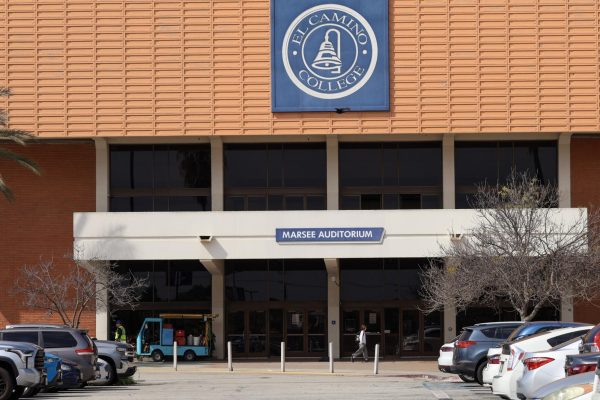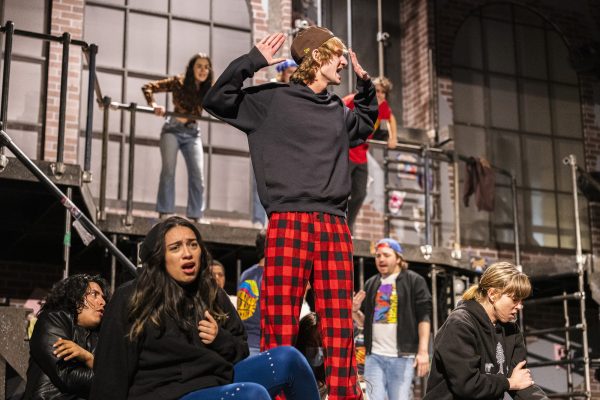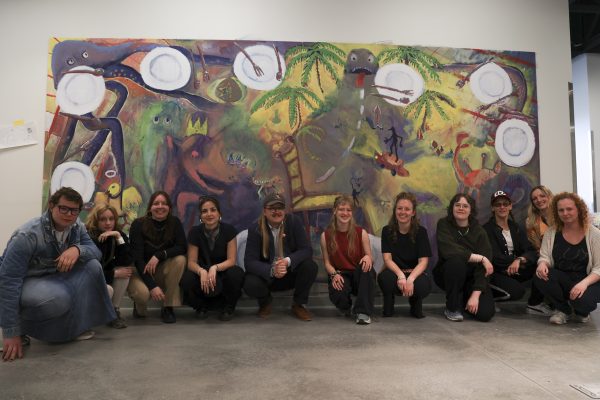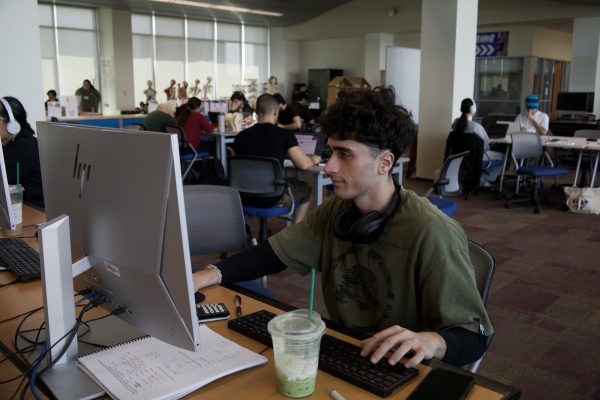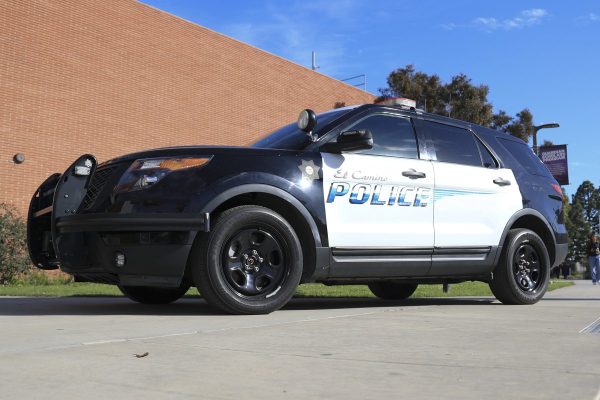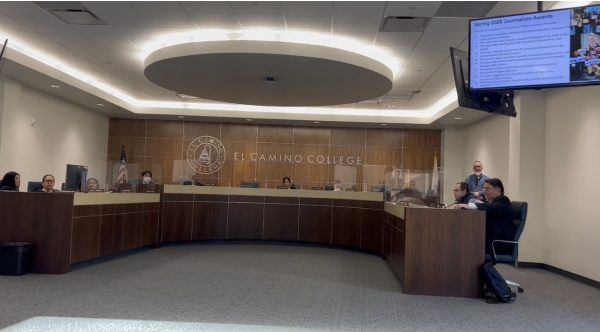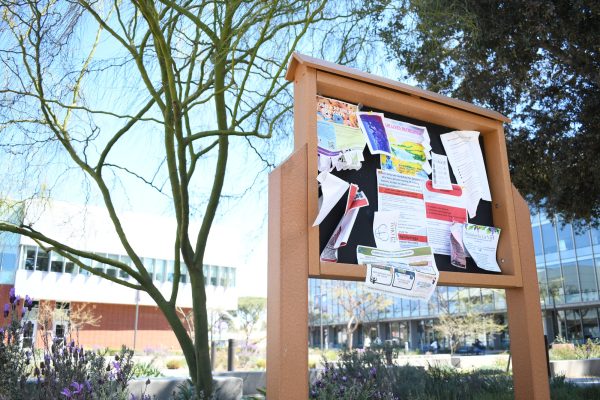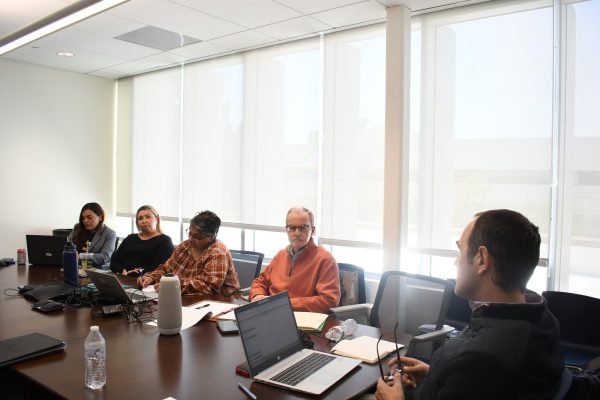Rebel with a cause
Erica Brenes, associate English professor at El Camino College, sits next to a bed of freshly bloomed daisies on her front porch in Long Beach on March 24. Brenes feels that poetry is a great vehicle to help her students connect with the humanities. “Poetry asks you to have a heightened awareness about the way you choose to spread and share your message,” Brenes said. (Walter Jay Jr. / The Union)
Out of an “HOLA Bonita” mug, she drinks luke-warm matcha tea sitting next to a bed of freshly bloomed daisies on her front porch. The sunlight beaming off of the purple lenses of her slightly gradient sunglasses, her bare feet rest on the asphalt of the walkway leading to her porch.
The sleeves of her warrior-blue Puente t-shirt and cuffs of her distressed light-blue jeans are meticulously folded up. She stares at the Sylvia Plath quote tattooed across her right foot.
“Let me live, love and say it well in good sentences…”
An associate English professor at El Camino College Erica Brenes has a passion for literature and holds a coveted position for poetry in her curriculum. The Presidential Inauguration shined a light on poetry with Amanda Gorman’s poem, “The Hill We Climb.”
Brenes used Gorman’s poem as a “welcome back to school assignment” to start the 2021 calendar year. An assignment that had an immediate impact on students like Evelyn Pasquel, an 18-year-old undeclared major at ECC and a “deep philosopher-poet” Brenes said.
“I was like ‘yes…!’ This is a Black woman. Yes please,” Pasquel said. “Her poem was beautiful. I liked it. I enjoyed it. I had to listen to it twice.”
Brenes is a self-proclaimed “lit nerd.” She loves stories like “The Great Gatsby” or “To Kill A Mockingbird,” but feels that to teach those works of literature without the proper context, or divorced from their racial arguments, is insulting and uninviting to students of color.
“You’re basically telling the student, I don’t care about the collateral narrative in this text, nor do I care with the collateral narrative in your life,” Brenes said. “So when I teach that book [‘To Kill A Mockingbird’] without the racial discussion and I’m inviting students of color into my classroom, I’m not truly inviting them into my classroom.”
Brenes feels that the traditional pillars of academic English continuously underserve her students, that the poem is misunderstood in higher education and that it is a much more receptive vehicle for the humanities.
“There’s a stigma on poetry on every level, at every college,” Brenes said. “There’s a lot of pressure on professors to teach the academic formal essay.”
Poetry, Brenes said is the vehicle best suited to help her students to form a connection with the English language.
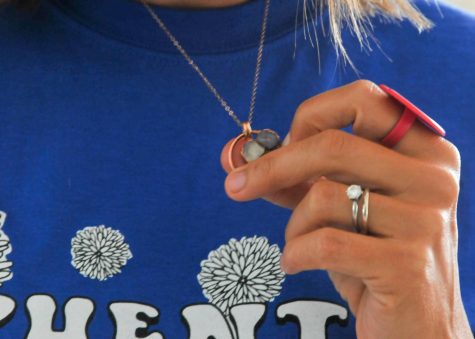
As Brenes pauses to compose her thoughts, she reaches for a bronze-colored pendant on a thin chain around her neck. She zips the adornment, with small trapezoidal grey stones in the center, back and forth on the chain. The constant motion polishing the otherwise noticeably dulled piece of jewelry.
Brenes exhales with a deep breath and closes her eyes. She takes one final moment to sum up her thoughts before articulating why she feels poetry is the vehicle best suited to help her students to form a connection with the English language.
“Poetry asks you to have a heightened awareness about the way you choose to spread and share your message,” Brenes said. “That kind of intentionality to form is automatic with poetry. It can happen in essays, but it’s a requirement of poetry.”
Back inside her home, Brenes pours hot water from the coffee maker to rejuvenate the now cold, damp tea bag laying in a barely-light-green puddle at the bottom of her mug.
Her desire to use poetry to rejuvenate student’s passion for the English language mimics the now reborn bag of tea in her mug. Brenes said her goal is to make her students better readers and writers for the rest of their lives and perhaps even get them to consider pursuing English as a field of study.in college.
“I think that if students were invited to sit in a room and listen to poems be read to them, and then read their own poems to other people you would probably find a lot of students who are pumped to major in English,” Brenes said.
Rhea Lewitzki, an associate English and poetry professor at ECC, shares Brenes’ sentiments and passions for poetry in higher education. Lewitzki said she provides opportunities for metacognition for her students via journaling and poetry.
“[Students] have to really reflect on what they learned, what they could have done better and what they would like to know,” Lewitzki said.“So much of what poetry is, to me, is the inward reflection, the examination, and then the examination of the world around us.”
The message Lewitzki said she tries to convey to her students is that it is their job, as poets, to transform the ordinary into the extraordinary.
Daniela Mejia, a student Brenes calls a “deep thinker,” is an 18-year-old nursing major at ECC. Mejia vividly recalls doing an assignment called “the found poem” in Brenes’ class that challenged her preconceived thoughts and helped her to find empathy in others.
“We learned a lot about the struggles of the LGBTQ community,” Mejia said. “It’s not something that my high school teachers taught us. Having this lesson being taught to us was something that I needed.”
Brenes empathizes with the sentiments of students like Mejia who feel a lack of passion, or even connection, with the subject material at the high school level.
“There is a line that a U.S. Poet Laureate used to have, that said, ‘high school is where poetry goes to die,’” Brenes said.
Brenes said she feels that the underrepresentation of people of color in academic curriculum, the lack of poetry being taught at the high school level, paired with students being required to take remedial English classes at the college level is leading to the death of humanities in higher education.
“We got excited about humanities because it was an opportunity to discuss big ideas, use your voice to exact change, or share something deep and special to you,” Brenes said. “Making students go through years of learning that didn’t have those things makes them tired of English before they even meet English.”
Pasquel said she remembers the first time she was introduced to English in a form that resonated with her. She read a poem called, “Dear Straight People” by Denice Frohman in Brenes’ class.
“The poems we explored were so deep and they resonated with me so much,” Pasquel said. “I [could] connect with a piece from somebody.”
Brenes said this is why she allows her students to turn in poems in lieu of prose. She argues that she doesn’t know any adult scholars who write essays.
“I think in a world of fragmentation, which is the world we live in, the traditional academic essay is no longer the form that matches the content,” Brenes said. “Poetry automatically asks you to ask yourself, ‘where do I see myself in the author?’”
Back in Brenes’ bijou kitchen, she tightly wraps her hands around a now piping hot cup of tea. As her fingers intertwine around the mug to absorb its warmth, Brenes waxes poetic about how her “super radical” peers are supportive of her endeavors.
“The space of the classroom only remains powerful if the professors who sit in it are among the professors who believe in its power and who want to stoke the fire within you,” Brenes said. “I have the honor of working among people who give me lots of love and celebrate what I do and what I bring to the classroom.”
Brenes said she hopes that ECC professors will remain “radical” in their approach to education by ensuring that there is always an open space for educators to deliberate on how best to face the challenges of higher education. However, doing so has been more difficult in the pandemic environment.
“It is very difficult, I think in community college to remain connected with each other, especially after the pandemic, because we’re not seeing each other face to face and having those hallway moments,” Brenes said.
Meanwhile, as the sun begins to get closer to the horizon Brenes moves to the backyard to remove her mask and get some fresh air. She sits on a homemade swing tied to the branch of an orange tree that she and her husband put up for their two kids.
As a breeze comes in from the east, Brenes pushes off the ground with the wind at her back. She gains more and more momentum as the swing begins to climb toward its apex. A large smile burst through Brenes’ face, leaving laugh lines in its wake.
Editor’s Note April 22, 2021, 3:51 p.m.: The story has been edited to add new details and clarification in a quote.
Editors Note April 22, 2021, 7:15 p.m.: Grammar mistake was corrected.


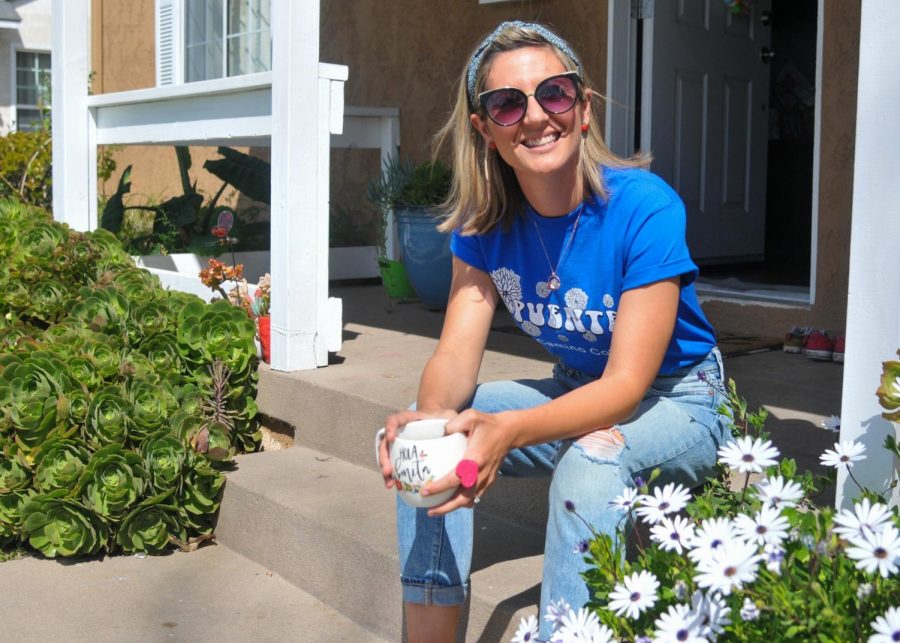
![Physics and astronomy professor Susan Stolovy presents astronomical news and updates to attendees at the first planetarium show of the semester at El Camino College on Friday, March 28. Prior to becoming a professor at ECC, Stolovy completed her doctorate in physics and worked as an astrophysicist for NASA and the California Institute of Technology on spacecraft missions. "[I'm] still very tuned into what's going on in the world of research as well, and I hope to bring a little bit of my experience into the classroom," Stolovy said. (Nikki Yunker | The Union)](https://eccunion.com/wp-content/uploads/2025/03/planetarium-Made-with-Clipchamp-3-frame-at-0m28s-600x338.jpg)
